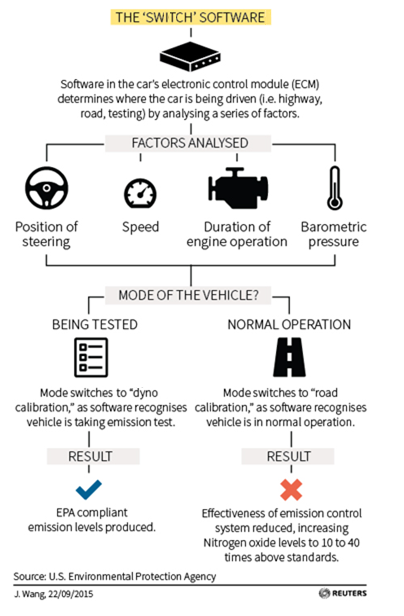Why in news?
Germany’s Federal Court of Justice (BGH) ruled against car manufacturer Volkswagen, the first judgment in the dieselgate scandal.
What was the “dieselgate scandal”?
- In 2015, the US Environmental Protection Agency (EPA) found that in over 590,000 diesel motor vehicles, Volkswagen had violated the Clean Air Act.
- The vehicles were equipped with “defeat devices” in the form of a computer software.
- This was designed to cheat on federal emissions tests.
- A defeat device is one that bypasses or renders inoperative a vehicle’s emission control system.
- Essentially, software of this kind is designed to detect when the vehicle is undergoing an emissions test.
- It then turns on full emissions controls during the testing period.
- In the course of normal driving, the effectiveness of such devices is reduced.

What did the EPA bring to light?
- EPA's notice in September 2015 alleged that Volkswagen installed these devices in its 2009-2015 two-litre diesel vehicles.
- It thereby was violating EPA’s emissions standards since these vehicles emit 40 times more pollution than the level permitted.
- Some of the affected vehicles included Jetta (2009-2015), Beetle (2013-2015) and Passat (2012-2015) among others.
- The major excess pollutant, in this case, was nitrogen oxides.
- In November 2015, the EPA issued a separate notice of violation of the Clean Air Act to car manufacturers Audi, Porsche and Volkswagen.
- This was for producing and selling certain 2014-2016 model 3-litre diesel cars and SUVs that included a software device for circumventing emissions standards.
- These vehicles emitted nine times more pollution than the standards allowed.
- Subsequently, Volkswagen informed the EPA that the defeat devices existed in all of its US three-litre diesel models since 2009.
- On filing of a complaint, in 2017, Volkswagen pleaded guilty to three criminal offence and agreed to pay $2.8 billion as a criminal penalty.
- Further, as separate civil resolutions of civil, environmental, customs and financial claims the company agreed to pay $1.5 billion.
What is the latest court ruling about?
- Following the EPA allegation in 2015 in the U.S., regulatory investigations were carried out against Volkswagen in several countries.
- These included South Korea, France, Italy, Germany, UK and Canada.
- In September 2015, Volkswagen revealed that over 1.2 million vehicles in the UK were involved in the diesel emissions scandal.
- Out of the 11 million affected vehicles worldwide, over 2.8 million were in Germany.
- So, in 2019, the Federation of German Consumer Organisations (VZBV) brought forward a case against Volkswagen on behalf of consumers in the country.
- Following this, the recent ruling by Germany’s Federal Court of Justice concerned a case involving petitioner Herbert Gilbert.
- He bought a used Volkswagen Sharan in early 2014 for approximately €31,000.
- In his case, Gilbert asked that the company pay him the full purchase price plus interest.
- Whereas, the Volkswagen group maintained that consumers did not suffer any damage from the manipulated diesel cars.
- The court however ruled that Gilbert be paid compensation to the tune of over €26,000, minus depreciation resulting from the kilometers he drove.
- The judgment also requires that petitioners return their cars to the company.
Why is the ruling significant?
- The ruling has set a crucial benchmark for over 60,000 such pending cases brought forward by German consumers.
- The company, on the other hand, has maintained that they would offer these consumers a payment.
- This would be less than what consumers can get through a court judgment.
- However, if consumers settle with the company directly they get to keep their vehicles.
- Several thousand consumers chose to settle with the company, due to which the recent ruling's impact will be limited.
- However, significantly, in the reasoning of their judgment, the judges maintained that it should be assumed that the Board of Directors knew about the manipulation because of the scale of the fraud.
Source: Indian Express
